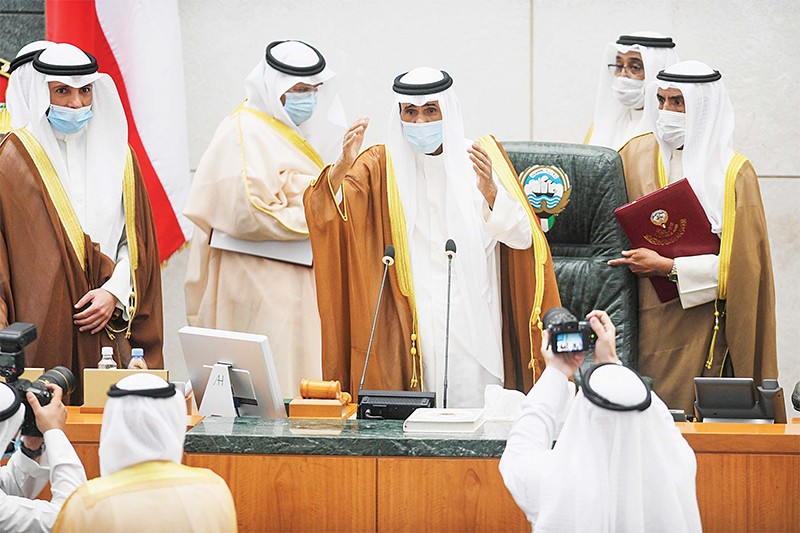30/09/2020
30/09/2020
‘Circumstances require unity and coordinated efforts’
KUWAIT CITY, Sept 30: In a historic parliamentary session Wednesday, His Highness the Amir Sheikh Nawaf Al-Ahmad Al-Jaber Al-Sabah took oath in accordance with Article 60 of the Constitution.

National Assembly Speaker Marzouq Al-Ghanim, HH the Prime Minister Sheikh Sabah Al-Khalid Al-Sabah and a number of senior State figures welcomed HH the Amir upon arrival at Abdullah Al-Salem Hall in the midst of applauding attendees including MPs, ministers and diplomatic delegations.
After taking oath, HH the Amir addressed the people of Kuwait. He paid tribute to HH the late Amir Sheikh Sabah Al-Ahmad Al-Jaber Al-Sabah, stressing that Kuwait lost an exceptional leader who steered the country during difficult times and left a great legacy of achievements not only in his homeland but also in the Arab and Muslim world and the globe as a whole.
He said the fatherly directives of HH the late Amir will never be forgotten and will always serve as guide for Kuwaiti policy. He pointed out that Kuwait faced several critical situations and difficult circumstances, but it managed to overcome them owing to the solidarity of the people. He asserted Kuwait is currently facing difficult challenges and circumstances which require unity and coordinated efforts.
He also affirmed commitment to the Constitution, democratic approach and rule of law adopted by Kuwait. He vowed to exert tremendous efforts and do his best to maintain the stability and security of Kuwait, in addition to protecting the citizens’ prosperity and dignity with the help of Allah the Almighty.
On the other hand, Al-Ghanim said HH the Amir graduated from the school of the late wise and foresighted leaders who managed the affairs of the country throughout the years. He disclosed that HH the Amir was close to these leaders and cooperated with them; thereby, helping him gain exemplary experience.
In his speech during the session, Al-Ghanim praised HH the late Amir Sheikh Sabah Al-Ahmad Al-Jaber Al-Sabah whom he described as a clever captain who successfully steered the nation’s ship despite the rough sea.
Addressing HH the Amir Sheikh Nawaf Al-Ahmad Al-Jaber Al-Sabah, Al-Ghanim said: “I am fully aware of your grief as you lost your teacher and big brother. You were his right hand. Nevertheless, all the Kuwaiti people know your charisma, humility and decisiveness.”
In conclusion, he voiced optimism over the new era ushered by HH the new Amir’s reign. He believes HH the Amir will continue the achievements of his ancestors and leave no space for corruption to exist or grow.
He then conveyed the congratulatory messages of MPs and citizens to His Highness the Amir Sheikh Nawaf Al-Ahmad Al-Jaber Al-Sabah.
The late Sheikh Sabah, 91, made his final journey to Kuwait later on Wednesday, his remains flying back to Kuwait City from Rochester, Minnesota, home of the flagship campus of the Mayo Clinic where he had been receiving medical treatment after surgery. State television broadcast live as the ruler’s body, draped in a Kuwaiti flag, arrived at the airport.
A host of Kuwaiti officials and close relatives carried the body aloft into an ambulance trailed by dozens of motorcycles and SUVs along a deserted highway. Although his funeral would ordinarily draw tens of thousands of Kuwaiti mourners and scores of foreign leaders and dignitaries, because of the coronavirus pandemic the burial was restricted to relatives, reported Kuwait’s state-run news agency, KUNA.
Yet Qatar’s Amir, Sheikh Tamim bin Hamad Al Thani, came to pay his respects, alongside an Emirati official, underscoring the late ruler’s deft navigation of the region’s stark political divides. Inside the spacious mosque, the late Amir’s adviser, with tears in his eyes and a trembling voice, led family members in solemn prayer. As mourners knelt in unison, Sheikh Nawaf performed the prayers, head bowed and eyes closed, from a chair, permissible in Islam for those unable to stand up or suffering from health issues. The coffin was then moved to a nearby cemetery, where close relatives shared a moment of silence and soldiers dug a fresh grave. Sheikh Nawaf and other mourners sprinkled dirt atop the body as it was finally lowered into the soil.
The state TV narrator sounded as though he was choking back tears. The breadth and depth of emotion over the loss of Sheikh Sabah, known for his diplomacy and peacemaking, was reflected in condolence messages that streamed in from countries on opposite ends of regional feuds, from Saudi Arabia to Iran and Qatar. The challenges are manifold. Gridlock in parliament has blocked the passage of a public debt law needed to raise $65 billion and mitigate the country’s looming liquidity crisis.
A major credit agency last week downgraded Kuwait for the first time in its history, citing the government’s swelling budget deficit. Plunging oil prices amid the surging coronavirus pandemic have robbed the wealthy country of cash. The economy still feeds on petrodollars and has been slow to diversify. Other headwinds include “unchecked corruption, mediocre government services and unresolved issues, such as the status of stateless persons,” wrote Bader Al-Saif, a nonresident fellow at the Carnegie Middle East Center in Beirut.
After the ceremony, Sheikh Nawaf, in his flowing robe, strode into a black Mercedes as groups of soldiers delivered a crisp salute. Sheikh Nawaf’s ascent to the throne bookended a political career that spanned from interior minister to defense minister, dating back to 1991 when US troops and their allies invaded Kuwait.
Sheikh Nawaf briefly served as social affairs and labor minister after the war, then as the deputy chief of Kuwait’s National Guard and again as interior minister.
He became the crown prince under Sheikh Sabah in February 2006, but was not known for making any major political decisions while serving as crown prince. The sheikh was educated in Kuwaiti schools and is married with four sons and one daughter. While his taking the reins was prescribed by Kuwait’s constitution, the succession plan remains uncertain. The late Sheikh Sabah came to power in 2006 by jumping a traditional order of alternating rule between two branches of the royal family, when parliament voted to oust his predecessor, the ailing Sheikh Saad Al-Abdullah Al-Sabah, just nine days into his rule.
Now Sheikh Nawaf has inherited the task of appointing a new crown prince. Kuwait stands out in the region for the power of its parliament, which retains the right to reject the Amir’s first choice. Kuwait’s chances for economic reform and reputation for neutrality in a turbulent region hang in the balance, said private intelligence agency Stratfor. Even under pressure from regional heavyweights Saudi Arabia and the United Arab Emirates, Sheikh Sabah long charted a path of diplomacy through the bitter dispute that pits Qatar against an alliance of Gulf states, as well as through other ruinous Mideast conflicts over the years, such as in Lebanon and Yemen.
By Saeed Mahmoud Saleh Arab Times Staff and Agencies


